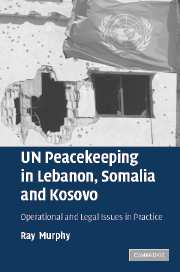Book contents
- Frontmatter
- Contents
- Preface and acknowledgments
- Maps
- 1 Introduction
- 2 The political and diplomatic background to the establishment of peace support operations in Lebanon, Somalia and Kosovo
- 3 Legal framework of UN peacekeeping forces and issues of command and control
- 4 United Nations peacekeeping in Lebanon, Somalia and Kosovo, and the use of force
- 5 UN military operations and international humanitarian and human rights law
- 6 Conclusion
- Appendix 1 Resolutions of the Security Council: UNIFIL
- Appendix 2 Resolutions of the Security Council: Somalia
- Appendix 3 Resolutions of the Security Council: Kosovo
- Bibliography
- Index
5 - UN military operations and international humanitarian and human rights law
Published online by Cambridge University Press: 22 July 2009
- Frontmatter
- Contents
- Preface and acknowledgments
- Maps
- 1 Introduction
- 2 The political and diplomatic background to the establishment of peace support operations in Lebanon, Somalia and Kosovo
- 3 Legal framework of UN peacekeeping forces and issues of command and control
- 4 United Nations peacekeeping in Lebanon, Somalia and Kosovo, and the use of force
- 5 UN military operations and international humanitarian and human rights law
- 6 Conclusion
- Appendix 1 Resolutions of the Security Council: UNIFIL
- Appendix 2 Resolutions of the Security Council: Somalia
- Appendix 3 Resolutions of the Security Council: Kosovo
- Bibliography
- Index
Summary
Introduction
Here is hand to hand struggle in all its horror and frightfulness: Austrians and Allies trampling each other under foot, killing one another on piles of bleeding corpses, felling their enemies with their rifle butts, crushing skulls, ripping bellies open with sabre and bayonet. No quarter is given; it is sheer butchery, a struggle between maddened beasts with blood and fury. Even the wounded fight to the last gasp. When they have no weapons left, they seize their enemies by the throat and they tear them with their teeth.
Henry Dunant, A Memory of SolferinoThis quote may seem at first to be somewhat out of place in a chapter dealing with UN peacekeeping and related military activity. Yet recent UN operations have had more in common with the operation conducted in Korea, or the enforcement measures carried out in the Congo during the 1960s, than with the more traditional peacekeeping prevalent during the 1970s and 1980s. When one looks at the actual combat engaged in by the United States Rangers in Mogadishu during their attempt to capture one of the leading warlords, General Aideed, or the coalition forces during the Gulf wars of 1991 and 2003, then Dunant's scenario may not be so far from the reality for the soldiers involved at first hand.
This chapter examines the applicability and relevance of international humanitarian law (humanitarian law) and international human rights law to all types of military action undertaken by or on behalf of the UN. Owing to the controversy surrounding action by UNOSOM forces in Somalia, the question of respect for the principles of humanitarian law by UN forces has been the subject of controversy and debate.
- Type
- Chapter
- Information
- UN Peacekeeping in Lebanon, Somalia and KosovoOperational and Legal Issues in Practice, pp. 214 - 293Publisher: Cambridge University PressPrint publication year: 2007



